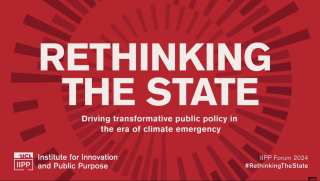Video's IIPP Forum 2024 - Rethinking the state
Governments globally are (re-)turning to diverse industrial policy instruments to fight multiple crises and tackle long-term societal challenges such as the climate emergency. Both mainstream and heterodox economists and social scientists have expressed support for the resurgence of state-led structural change, and there is a vibrant discussion about how industrial policy instruments should be made fit for purpose for today’s challenges. However, there is much less discussion about whether governments have the capacity to design, implement and evaluate an effective set of industrial and other transformative policies.
As the industrial strategy is being updated to fit the needs of 21st-century challenges and political realities, this session will investigate whether governments – and researchers – are updating the way to create capable agencies, effective coordination mechanisms and proper evaluation tools for new industrial policy mixes.
The transformative policy is shifting policy logic from fixing a variety of market and systems failures to actively shaping markets for desirable outcomes, and this requires governments to build appropriate organisations and public sector capacities to take on such tasks.
Financing the ecological transition
The ecological transition requires a fundamental transformation of our economies, and with it, financial flows. Historically, the key macroeconomic institutions - central banks and ministries of finance – coordinated together and with other government ministries to steer private credit & finance markets to achieve structural economic change.
Today, the dominant policy narrative relies on the private sector to lead the pace and direction of the green transition. Policy interventions by financial and fiscal authorities are limited to mandate-relevant actions that support price and financial stability and constrained by concerns over public debt sustainability. Emerging market developing economies face huge fiscal challenges in implementing large-scale green investment. This session critically examined the dominant policy narrative in which the private sector dictates the pace and direction of the green transition and considered alternative macrofinancial arrangements, including global reforms, that could more effectively steer economies towards sustainable well-being.
Designing Transformation
The last century saw the role of design in society grow from an enabler of industrialization and mass production to drivers of digital services, but with the climate crisis upon us, now is the time to widen the design discourse to take on the grand, complex challenges we face today. This session explores if and how design strategies can accelerate the shift in policy practice needed to support transformation on the scale that the climate crisis demands.
Public sector capabilities for net zero missions
Across the OECD alone, more than 80 'net-zero missions' have been adopted across 20 countries that target large reductions in greenhouse gas emissions by 2030. Using the ongoing development at IIPP of a Public Sector Capability Index as a frame and bringing to the forefront this wealth of experience of driving these net zero missions, the IIPP Forum 2024 presents an interactive session focused on fostering knowledge exchange and peer-learning among policymakers and practitioners, dealing with similar challenges in strengthening their organisational capabilities for the green transition.
The digital era has brought about significant changes in how societies operate, and the expectations placed upon governments to deliver services, policies, and goods effectively and at scale. Paper-based, siloed government infrastructure and associated practices are no longer effective in the 21st century. Moving towards digital-era government implies rethinking how governments operate and what public infrastructure means.
This session explored a new way of thinking about digital transformation: an infrastructural approach. By leveraging IIPP's practice-oriented research on digital public infrastructure (DPI), was discussed:
- What an infrastructural approach looks like and how to develop the state capacity required to build it at scale;
- How to build and govern DPI to maximise public value creation;
- How a DPI approach can support a just green transition;
- A common good approach to digital transformation.

